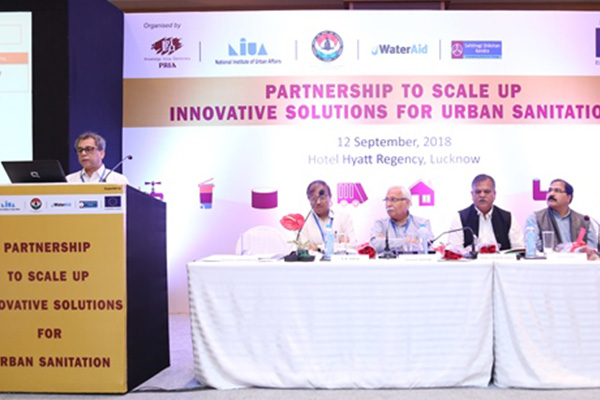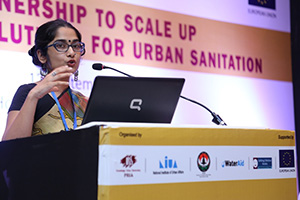| Date 12-Sep-2018 to 12-Sep-2018 |
Location Lucknow, Uttar Pradesh |
Format Sub National |
A state level conference on ‘Partnership to Scale up Innovative Solutions for Urban Sanitation’ was held on Hotel Hyatt Regency, September 12, 2018 in Lucknow, Uttar Pradesh. The conference was organised by Participatory Research in Asia (PRIA) under the ambit of ‘Engaged Citizen, Responsive City’ project in collaboration with National Institute of Urban Affairs (NIUA); Regional Centre for Urban and Environmental Studies (RCUES), Ministry of Housing and Urban Affairs, Government of India; Water Aid India and Sahbhagi Sikshan Kendra (SSK), Lucknow. The conference was supported by European Union. The conference was attended by Sh Manoj Kumar Singh (IAS), Principal Secretary, Sh G S Priyadarshi (IAS), Secretary and Sh P K Srivastava, Addl. Mission Director (AMRUT), Urban Development Department, Uttar Pradesh, Prof Nishith Rai, Director and Er. A K Gupta, Addl. Director, RCUES, Lucknow along with other speakers and dignitaries.
The aim of the conference was (a) to showcase scalable innovative solutions to address the challenges of inclusive urban sanitation services (b) to create a learning and knowledge platform through multi-stakeholder dialogues (b) to Inform and influence policies and institutions to enhance the impact of urban sanitation programmes in Uttar Pradesh.
The conference was an attempt to bring together policy makers, researchers, and practitioners across governments, ULBs, parastatals, CSOs, academia, media, CSR, and representatives from the communities to gain insights on how a partnership approach can scale up innovations and capacity development with respect to urban sanitation solutions.
The conference was organised into four technical sessions. The first session discussed the implementation challenges of achieving ODF + and ODF ++ and tried to identify innovative solutions. The second session highlighted the changing realities of sanitation workers and discussed the interventions required in the public policy to ensure work-life dignity of sanitation workers. The third session deliberated upon emerging practices related to building resilience of the cities by improving environmental sanitation with special reference to waste management. The fourth and final session explored the effectiveness of institutional mechanisms and efforts by ULBs and other stakeholders to foster citizen and civil society engagement.
 The conference opened up critical discussions on the need for a comprehensive strategy for convergent work in urban spaces by convening multi-stakeholder participation. While Uttar Pradesh is one of the least urbanised states in the country, yet urbanisation is happening aggressively which is an opportunity for the state to plan it.
The conference opened up critical discussions on the need for a comprehensive strategy for convergent work in urban spaces by convening multi-stakeholder participation. While Uttar Pradesh is one of the least urbanised states in the country, yet urbanisation is happening aggressively which is an opportunity for the state to plan it.
It was agreed that urban sanitation solutions need to be found locally through specific solutions with a focus on decentralised solutions rather than focussing on FSTP alone. While policies can give the states and the cities frameworks, standard operating procedures for the provisions in the policies need to be locally decided for effective action.
The workshop was successful in building a consensus amongst the policy makers and government officials on the urgent actions required to be taken to improve the working environment of sanitation workers. It was asserted that ULB officials must enforce the provisions such as EPF, minimum wages, regular health care and safety gears for sanitation workers as they are non-negotiable provisions in the labour law and must be effectively implemented. ULBs were also urged to show willingness and encourage sanitation workers to undertake skill trainings for which the funds are mobilised through the collaborative approach of NSDC, NSFKDC and NULM. It was also suggested to the state that 1000 informal workers in Jhansi Municipal Corporation could be assessed for RPL and provided skill training through the convergence of SBM, NULM and NSDC can be taken forward for skilling sanitation workers so that they are able to draw the benefits of relevant schemes. Formalising the service providers was suggested to cater to the sludge management market.
It was affirmed that sanitation jobs are to be looked with dignity and sanitation workers must be respected which cannot be addressed by paying out more money or by assigning caste neutral names to the SC communities. It was also proposed that sanitation workers must be made aware of their rights under the labour laws by using IEC funds under SBM through sensitisation programmes.
Emphasis was given on the need for strengthening the implementing agencies especially the ULBs and elected representatives, by building capacities of individuals, organisations, and creating and enabling environment through policy and guidelines.
 Significance of citizen participation in implementing urban sanitation solution challenges was widely recognised by the participants in the conference. An inclusive strategy to enable the participation of urban poor as citizens in city planning was felt to be crucial. A strong need was felt for enforcing the 74th amendment and provisions for community engagement such as holding ward sabha and mohalla sabhas. Gleaning the learnings from the successes of cities such as Indore, Pune, Tiruchirapally, Bhubaneswar and Nagpur it was re-affirmed that these cities have showcased active engagement of mayor, elected representatives, CSOs and ULBs where they have come together to make the city as models in urban sanitation management.
Significance of citizen participation in implementing urban sanitation solution challenges was widely recognised by the participants in the conference. An inclusive strategy to enable the participation of urban poor as citizens in city planning was felt to be crucial. A strong need was felt for enforcing the 74th amendment and provisions for community engagement such as holding ward sabha and mohalla sabhas. Gleaning the learnings from the successes of cities such as Indore, Pune, Tiruchirapally, Bhubaneswar and Nagpur it was re-affirmed that these cities have showcased active engagement of mayor, elected representatives, CSOs and ULBs where they have come together to make the city as models in urban sanitation management.
The day long conversation was concluded with an aspiration to build and practice the convergence through partnerships to achieve the goals of urban sanitation in the cities of Uttar Pradesh.
Summary of Proceedings
1. Services Provisioning for Sanitation:2. Citizen and Community Engagement:
3 Human Resource Related Aspects:
4. Governance Issues: